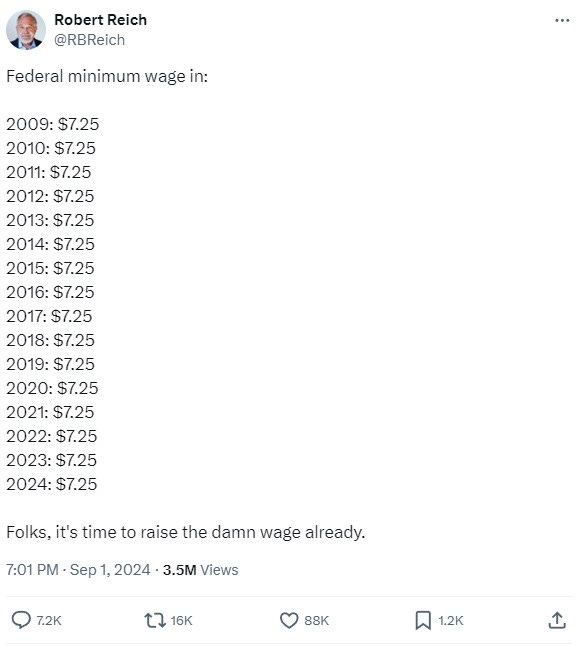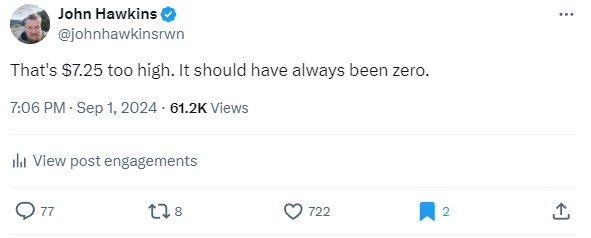Why It Would Be Good if the Minimum Wage Dropped to Zero
Former Clinton Secretary of Labor Robert B. Reich basically spends his days deliberately spreading economic misinformation on X, formerly known as Twitter. For whatever reason, one of his more mundane posts went viral:
My response to the post got a good bit of traction…
However, one thing I could not help but notice in the replies to the tweet was that there were a lot of people who genuinely didn’t seem to understand how wages work:
It’s hard for me to understand that, but then again, I’ve also learned that there are pretty clearly a lot of people who don’t understand the whole concept of “per capita,” so maybe this shouldn’t be a surprise. On top of that, we have a bit of a coddled society. A lot of people have never run any kind of a business, have never worked for themselves, even if it was just mowing yards as a kid, and the schools along with the media are essentially just MIA when it comes to teaching people basic economics.
So, let’s get back to basics.
First of all, just as companies compete for customers, they also compete for workers. The more money and perks a business can offer, the better the quality of workers they can employ.
Some jobs don’t need much more than a warm body, while others need highly specialized, highly skilled people to function. At the top of the scale, you can get insane salaries, stock benefits, and things like onsite yoga classes, free posh housing, and company concerts played by genuine celebrities. At the low-skill end of the scale, where you have little to offer to an employer, you may be just getting minimum wage.
It really depends on what sort of employees you need to fill out your business. A top-flight CEO or Lebron James is going to make more than a top-flight engineer or doctor, who will make more than a teacher or plumber, who makes more than a fast-food worker.
Some people assume that a large portion of the population is getting minimum wage or that the lowest legally allowed wage is somehow stopping a “race to the bottom” that would cause every company to slash what they pay employees.
This is not true.
Although the exact percentage is controversial, the number of employees actually getting a minimum wage is somewhere around 1.5% of the workforce. We’re mostly talking about high school students in their first McJob or the lowest performing, lowest skilled employees in our entire workforce.
So, why if the government-mandated minimum wage is only $7.25 are the overwhelming majority of employees making MORE than that? Because again, businesses with a better quality of employees have a competitive advantage. How much of an advantage depends on the industry.
Having the best chef or NFL running back may be a huge competitive advantage, while having the best janitor or Wal-Mart greeter may not add much to the bottom line. If you want the best employees, you have to give those employees an incentive to work for you instead of working for someone else or alternately, just starting their own business.
For example, where I live, it basically costs $60 to get a plumber to show up to your house, even if they do 5 minutes' worth of work. Let’s say the plumbing company I usually get decided they’d only pay their plumbers the minimum wage. What do you think would happen? All the plumbers would either leave and go to competing plumbing companies that would pay them more or they’d go out on their own. That’s the beauty of capitalism. It’s a competition from top-to-bottom. The more value you bring to the table, the more opportunities you have to get paid.
That ties into what’s wrong with a “minimum wage.”
It’s the government saying, “Look, I don’t care if you and an employee come to an agreement on a salary. If it’s below $7.25 per hour, that’s not allowed.” Now happily, because the minimum wage has been in the same place for so long, it doesn’t currently create a massive distortion of the market. In other words, today there are not legions of people who would be willing to work for less than the minimum wage, but there are probably some. If there’s some super easy job someone would be willing to pay less than the minimum wage for and someone willing to do it, why should the government say, “You’re not allowed to voluntarily work together?”
On top of that, you always have to pick your poison with the minimum wage. Either it’s low enough that it impacts a tiny number of people and thus, is basically pointless, or if you raise it too high, it massively distorts the market.
A minimum wage that impacted a big chunk of the workforce would begin by causing prices to go up and large numbers of starter jobs to disappear. If it goes even higher, it would amount to government-mandated inflation. In other words, if the government essentially said, “Even burger flippers have to make $50 per hour,” well not only is that going to drive the cost of burgers into the stratosphere, but all the people making $50 per hour today are going to demand $200 per hour tomorrow to show up not just because burgers cost more, but because they’re flat-out worth orders of magnitude more than a burger flipper.
That’s why the best thing the government could do is stay out of the wage-setting business completely. Ultimately, no good is going to come of it, but lots of harm can be created.
Instead, if someone isn’t making enough money, they should try to try to find someone else that will pay them more money. If they’re not skilled enough to be worth more money, they should improve their skills. The end.







There is a fairly clear study being done on exactly this question: As a general statement, do higher minimum wages help or hinder workers? The experiment is called California, and the initial results do not look promising...
Robert Reich has been grifting, grafting and griping on a subject which is purportedly his field, but one in which he is entirely ignorant. And he suffers from Little Napoleon Syndrome. From Wikipedia "The Napoleon complex, also known as Napoleon syndrome and short-man syndrome, is a purported condition normally attributed to people of short stature, with overly aggressive or domineering social behavior. It implies that such behavior is to compensate for the subject's physical or social shortcomings." I won't even speculate on the size of his penis, but I'm betting he drives a souped up sports car or Corvette. Silly little man.